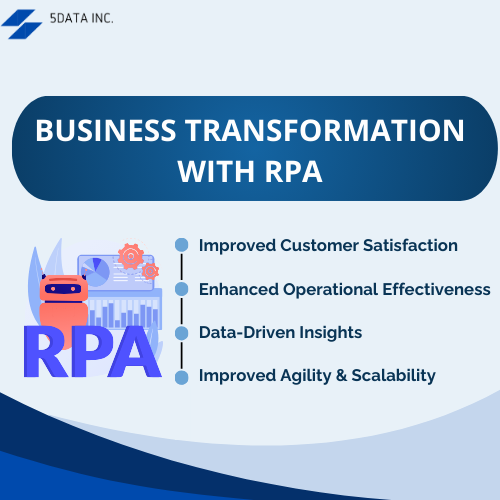What we cover in this blog
Key Takeaways
- RPA automates repetitive tasks, freeing employees for more valuable work and reducing errors.
- Streamlines workflows, improving efficiency and reducing processing times.
- Identifies and optimizes areas for automation, ensuring continuous improvement.
- Ensures secure, accurate data control, which is crucial for compliance-heavy industries.
- Enhances job satisfaction by shifting focus to strategic tasks, boosting accuracy, and reducing workloads.
The Crucial Role of RPA in Streamlining Processes
Digital transformation necessitates streamlining critical business processes. RPA acts as a catalyst for streamlining operations, achieving this by:
- Automate Repetitive Tasks: RPA tackles time-consuming, routine tasks that often lead to human error. Automating these tasks frees up employees for higher-value activities, boosting productivity and reducing errors.
- Streamlining Operations: By automating tasks across departments, RPA streamlines entire workflows. It improves efficiency, reduces processing times, and allows for faster response rates.
- Optimizing Processes: RPA implementation encourages process optimization. Businesses identify and analyze data from existing workflows to pinpoint areas for automation. This continuous improvement approach ensures processes are efficient and optimized for the digital age.
- Data management and Security: RPA ensures accurate and secure data control by following predefined rules and protocols. It is particularly important in industries such as finance and healthcare, where cybersecurity and compliance are critical.
Data Collection and Data Management Service Providers play a crucial role in critical systems and ensure the accurate and efficient handling of business-critical information.
Why is RPA Empowering to Employees?
Contrary to the misconception that Robotic Process Automation (RPA) replaces human workers, it actually empowers them. Implementing RPA offers numerous benefits that contribute to the overall success and digital transformation of the digital workforce in an organization. These benefits include:
- Increased Accuracy: Automation enhances accuracy by eliminating human error inherent in repetitive tasks, thereby improving data precision and minimizing rework requirements, resulting in superior outcomes.
- Faster Turnaround Times: Automated processes are executed much faster than manual ones, resulting in quicker turnaround times and improved customer satisfaction.
- Improved Job Satisfaction: By automating mundane tasks, employees can focus on intellectually stimulating work that leverages their skills and expertise. This fosters job satisfaction and engagement.
- Resource Optimization: RPA allows organizations to allocate resources more effectively, focusing human talent on strategic RPA initiatives rather than mundane tasks.
- Support for Digital Transformation: RPA is essential for advancing digital transformation, allowing businesses to update operations and sustain competitiveness in today’s digital-focused landscape.
- Reduced Workload: RPA automates routine tasks, freeing up employees to focus on more strategic objectives and creative endeavors. It reduces stress and burnout, allowing employees to contribute greater value.
The Importance Of Automation And Digitization
Automation technology and digitization are essential components of modern business and digital transformation strategies. They enable organizations to remain competitive, agile, and responsive in a rapidly changing market landscape. Incorporating Robotic Process Automation (RPA) into business operations is a vital step toward accomplishing these objectives.
Key Importance:
- Operational Efficiency: Automation streamlines operations by reducing manual intervention and minimizing errors. It leads to faster process execution and improved overall efficiency.
- Cost Savings: Through the automation of repetitive and time-consuming tasks, businesses can achieve substantial reductions in labor costs and operational expenses. RPA also minimizes the risk of human error, which can lead to costly mistakes.
- Scalability: RPA tools are highly scalable, allowing businesses to expand their automation efforts as needed. This scalability is crucial for supporting business growth and managing increasing workloads.
- Data-Driven Insights: Automation and digitization enable businesses to collect and analyze large volumes of data. This data offers opportunities to uncover valuable insights, guide strategic decisions, and enhance business intelligence.
In today’s modern business operations, robotic process automation has emerged as a transformative force. By seamlessly integrating with existing systems, RPA bots streamline process automation across various domains, from supply chain management to everyday business processes. These advanced bots specialize in automating routine and administrative duties, liberating precious human resources to concentrate on strategic pursuits. In supply chain management, RPA offers unparalleled efficiency gains, ensuring smoother workflows and heightened productivity. Embracing RPA heralds a new era of agile and optimized business processes, driving innovation and competitive advantage.
Data Life Cycle Management Services ensure seamless data handling from creation to disposal, optimizing data integrity and security throughout its lifespan.
The Expanding Role of RPA with Artificial Intelligence (AI)
While RPA excels at automating rule-based, mundane tasks only, its capabilities can be further enhanced when combined with Artificial Intelligence (AI). This integration unlocks new frontiers in process automation, enabling:
- Cognitive Automation: AI-powered RPA tools can handle tasks that require some level of cognitive ability, such as pattern recognition and decision-making based on predefined rules. It expands the scope of automation beyond simple data manipulation.
- Machine Learning: Machine learning algorithms can continuously learn and improve RPA processes over time. It allows bots to adapt to changing conditions and handle unforeseen scenarios, further improving efficiency.
- Intelligent Automation: The synergy between RPA and AI paves the way for Intelligent Automation. This advanced technology combines the strengths of both, leading to a more sophisticated and adaptable approach to automation.

Business Transformation with RPA
RPA serves as a powerful tool for digitization and driving business transformation. Here’s how:
- Improved Customer Satisfaction: Faster response times, accurate data, and streamlined processes lead to a more positive customer experience.
- Enhanced Operational Effectiveness: Automating everyday tasks cuts costs, enhances accuracy, and streamlines workflows, leading to greater efficiency and a stronger financial outcome.
- Data-Driven Insights: RPA facilitates the collection and analysis of vast amounts of data. It enables businesses to leverage data-driven decisions that optimize operations and foster growth.
- Improved Agility & Scalability: RPA allows businesses to adapt quickly to changing market conditions. Scalable solutions can adapt to increasing workloads, ensuring smooth operations and continuous improvement.
The Future of RPA: Emerging Technologies and Trends
With continuous advancements in technology, Robotic Process Automation(RPA) is poised for further evolution. Here are some exciting trends shaping the future of RPA adoption:
- Intelligent Computing: As AI capabilities improve, RPA solutions will increasingly incorporate cognitive automation, enabling them to handle more complex processes and tasks.
- Process Mining: Process mining tools will further enhance RPA integration by analyzing workflows and identifying the most optimal areas for business automation initiatives.
- Cloud-Based RPA: Cloud-based RPA solutions will offer greater scalability, flexibility, and cost efficiency for businesses of all sizes.
Conclusion
Robotic Process Automation (RPA) is a transformative technology empowering businesses to streamline processes, boost efficiency, and unlock valuable insights. By automating standard tasks and integrating seamlessly with other technologies, RPA paves the way for a more efficient, agile, and data-driven future. As RPA advances, businesses that embrace its potential will be strategically positioned to thrive in the digital era.
Frequently Asked Questions (FAQS)
Can RPA handle complex cognitive tasks well?
- While RPA excels at structured tasks, its capabilities can be enhanced by integrating AI to handle tasks requiring human resources and some level of cognitive ability. It paves the way for Intelligent Automation, a more sophisticated approach to automation.
How does RPA integrate with existing computer systems?
- RPA integrates seamlessly with present systems without requiring significant changes to the business functions IT infrastructure. It interacts with applications and systems at the user interface level, mimicking human actions to perform tasks.
Which industries can derive benefits from RPA?
- RPA offers benefits across various industries, such as finance, healthcare, manufacturing, retail, and logistics, enabling any sector dependent on repetitive, structured tasks to enhance efficiency and cost-effectiveness.
What are the key considerations for successful RPA implementation?
- Successful RPA deployment for big data analytics requires careful planning and execution. Key considerations include:
- Selecting the right processes for automation.
- Ensuring data security and compliance.
- Providing adequate training and support to employees.

Rasmita Patro
Author
